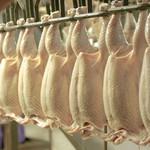Chicken processors in Thailand will be forced to lower production over the coming years, according to a report from the USDA Global Agriculture Information Network.

While production is estimated to grow sharply in 2012 by 15% to 1.55mn tonnes from 1.35mn tonnes, processors are still likely to scale down their production in the last quarter of 2012 and most of 2013.
“This will likely reduce broiler meat production by 6% to 1.45mn tonnes in 2013,” the report said.
The reduction will comes as a result of the industry encountering pressure from a significant reduction in prices for products across the board, as well as increasing production costs.
Feed and production costs an obstacle
The report said that overall export prices for nearly all cooked chicken products declined in 2012 because of accumulating stocks in Thailand, while the economic turmoil in the EU has led to sluggish demand for Thai chicken meat.
Export prices for steamed dice-shape-cut skinless boneless breast, a major item exported to the EU, reportedly dropped from between US$5,000 and US$5,100 per tonne in mid 2011 to between US$4,200 and US$4,300 per tonne today.
Meanwhile, higher production costs derived from escalating world prices for feed ingredients like soybean meal and corn have put the broiler industry under further pressure, the report said.
Soybean meal prices escalated by 50% from 14 baht per kg in January 2012 to 21 baht per kg in August, while corn prices jumped by 33% during the same period, from about 10 baht per kg to 11-12 baht per kg.
“Integrated broiler processors are worried that a drought in the US may further push feed prices upward for the remainder of 2012.”
Domestic market strong
According to the report, domestic consumption of broiler meat continues to grow primarily because of the expansion of quick-service restaurants and ready-to-eat markets, and the fact that chicken meat is less expensive than other meats.
Though higher chicken prices will limit growth in domestic consumption next year to only 3%, per-capita consumption of chicken meat should continue to grow from 13.7kg per person per year in 2012 to 14.1kg.
“An increase in domestic consumption should be partly attributed to efforts that promote new RTE chicken menus in the domestic market by QSR and food processors. This RTE market should grow 10-15% annually in the next five years.”
Opportunities galore
However, Thailand does remain a potentially significant market for US chicken parts, mechanically deboned meat and value-added chicken meat.
“Potential buyers for chicken parts and mechanically deboned meat are food processors and supermarkets. Value-added chicken meat can also be introduced to modern retail markets and the food-service industry.”
The country could also import bone-in-leg chicken meat for processing and re-export it to such markets as Japan and non-EUcountries, although tariffs could be a barrier to this.
Thailand protects its poultry market through its government’s use of non-transparent control import permits, high WTO bound rates of import tariffs currently at 30-40%, and a discriminatory import permit fee on uncooked products of 10 baht per kg or US$339 per ton.

While production is estimated to grow sharply in 2012 by 15% to 1.55mn tonnes from 1.35mn tonnes, processors are still likely to scale down their production in the last quarter of 2012 and most of 2013.
“This will likely reduce broiler meat production by 6% to 1.45mn tonnes in 2013,” the report said.
The reduction will comes as a result of the industry encountering pressure from a significant reduction in prices for products across the board, as well as increasing production costs.
Feed and production costs an obstacle
The report said that overall export prices for nearly all cooked chicken products declined in 2012 because of accumulating stocks in Thailand, while the economic turmoil in the EU has led to sluggish demand for Thai chicken meat.
Export prices for steamed dice-shape-cut skinless boneless breast, a major item exported to the EU, reportedly dropped from between US$5,000 and US$5,100 per tonne in mid 2011 to between US$4,200 and US$4,300 per tonne today.
Meanwhile, higher production costs derived from escalating world prices for feed ingredients like soybean meal and corn have put the broiler industry under further pressure, the report said.
Soybean meal prices escalated by 50% from 14 baht per kg in January 2012 to 21 baht per kg in August, while corn prices jumped by 33% during the same period, from about 10 baht per kg to 11-12 baht per kg.
“Integrated broiler processors are worried that a drought in the US may further push feed prices upward for the remainder of 2012.”
Domestic market strong
According to the report, domestic consumption of broiler meat continues to grow primarily because of the expansion of quick-service restaurants and ready-to-eat markets, and the fact that chicken meat is less expensive than other meats.
Though higher chicken prices will limit growth in domestic consumption next year to only 3%, per-capita consumption of chicken meat should continue to grow from 13.7kg per person per year in 2012 to 14.1kg.
“An increase in domestic consumption should be partly attributed to efforts that promote new RTE chicken menus in the domestic market by QSR and food processors. This RTE market should grow 10-15% annually in the next five years.”
Opportunities galore
However, Thailand does remain a potentially significant market for US chicken parts, mechanically deboned meat and value-added chicken meat.
“Potential buyers for chicken parts and mechanically deboned meat are food processors and supermarkets. Value-added chicken meat can also be introduced to modern retail markets and the food-service industry.”
The country could also import bone-in-leg chicken meat for processing and re-export it to such markets as Japan and non-EUcountries, although tariffs could be a barrier to this.
Thailand protects its poultry market through its government’s use of non-transparent control import permits, high WTO bound rates of import tariffs currently at 30-40%, and a discriminatory import permit fee on uncooked products of 10 baht per kg or US$339 per ton.





